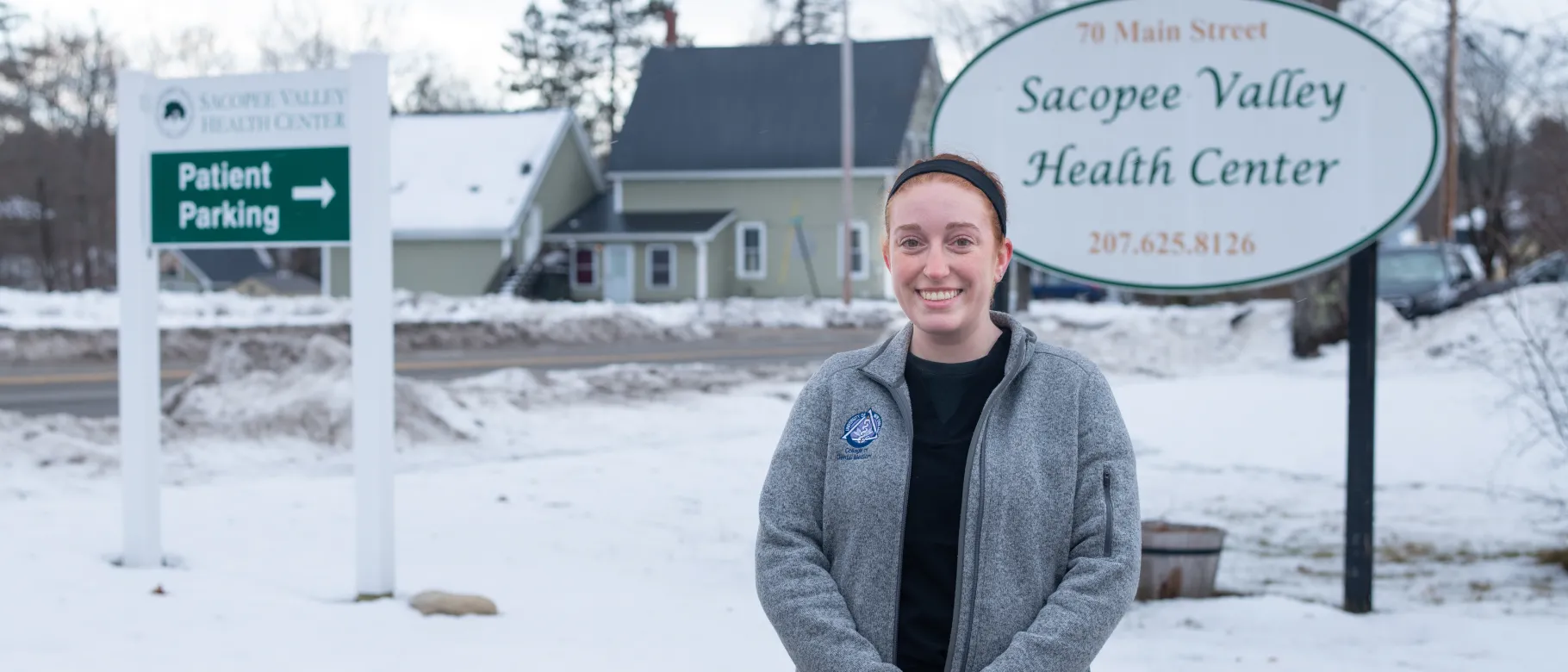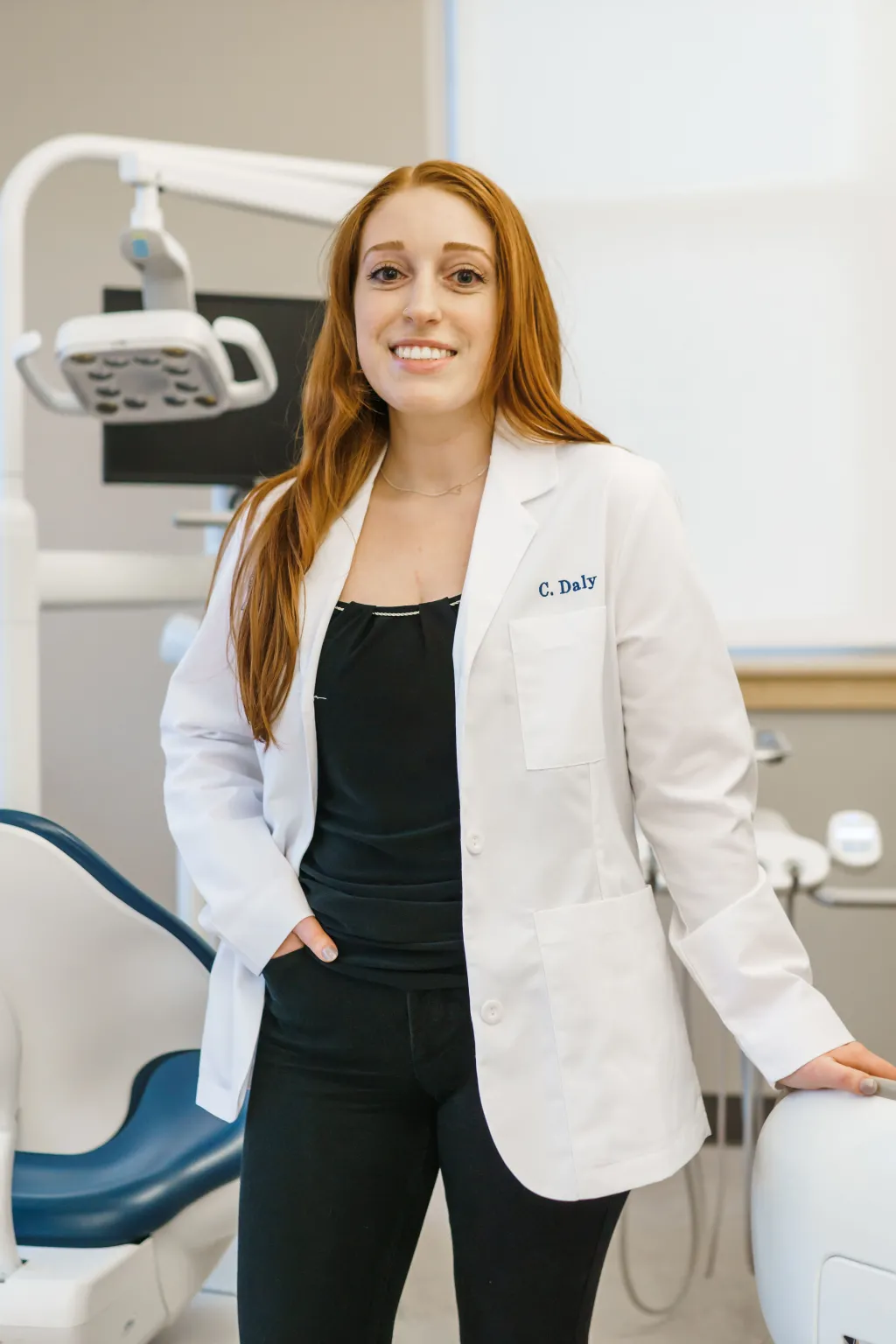UNE Grows Ranks of Rural Health Care Providers with grant from M&T Bank

Nestled between the foothills of the western Maine mountains and the meandering Ossipee River, Sacopee Valley Health Center offers medical and dental services to a rural population in a quiet, bucolic setting.
For Caitlyn Daly (D.M.D., ’25), working at the health center for her clinical rotation at the University of New England’s College of Dental Medicine was a welcome challenge that painted the work in rural dentistry as a rewarding career rich in valuable life lessons.
As a result, Daly now plans to pursue work at a rural health practice when she graduates from UNE with her Doctor of Dental Medicine degree in May.
“There’s a real sense of satisfaction in knowing that you’re providing essential care to a community that might not have easy access to dental services,” Daly said. “I’ve come to appreciate the tight-knit, supportive nature of rural communities, where relationships are built on trust and familiarity.”
Daly’s rural dental clerkship in Porter, Maine, was made possible by a $2,500 M&T Bank Rural Clinical Rotation Stipend from the M&T Charitable Foundation that is aimed at growing the ranks of rural health care providers in the state. Daly was one of three students enrolled in UNE’s dental or osteopathic medical school this fall to receive the award that helped make a rural clerkship more affordable. It’s part of the bank’s longstanding commitment to help the University in its mission to grow the health care workforce in rural communities.
All told, the bank awarded 10 Rural Clinical Rotation Stipends to UNE students in 2024 for the second year, and it will fund another 10 in each of the next three years. The M&T Charitable Foundation grants were awarded to UNE students pursuing clinical rotations in rural areas of Maine in fields such as osteopathic medicine, dentistry, physical therapy, occupational therapy, physician assistant, pharmacy, and nursing.
“It’s allowed me to focus more on my learning and patient care without worrying as much about the cost of travel or living expenses,” Daly said. “I’m grateful for the support, and it’s made it possible for me to fully immerse myself in this experience without financial stress.”
The grants are especially needed at this time with the health care workforce shortage across Maine, said Zoe Hull, M.P.H, the director of the Maine Area Health Education Center (AHEC) Network at UNE’s Center for Excellence in Public Health, which administers the grants.
“A critical part of addressing those shortages is getting students in the health professions to experience what it's like to work and live in those areas,” Hull said. “And a barrier to being able to do that for some is the cost of housing, which can be expensive when a student completes a rotation in a rural area rather than somewhere local. This grant makes that possible.”
The grants are particularly important for the third-year students in UNE’s College of Osteopathic Medicine since those clinical rotations can put them far afield, such as four hours north of Portland near the Canadian border.
That’s where Gabriel Curtisbrown (D.O., ’26) is pursuing his required third-year clinical rotation in UNE’s osteopathic medical school at a hospital in the northern Maine city of Presque Isle. For Curtisbrown, the M&T Charitable Foundation Grant supported his participation in a Longitudinal Integrated Curriculum, an enhanced clinical-rotation program at UNE that requires a research project. Curtisbrown is focusing on mental health in a rural community for that research project.
For someone who grew up next door to bustling Portland in Windham, Maine, conducting a clinical rotation in Aroostook County near the Canadian border proved a lesson in how to be nimble, patient, and attentive as a health care provider given the demands on health care professionals in rural Maine.
In 2022, the Maine Shared Community Health Needs Assessment Report for Aroostook County identified access to health care in the county as a top priority that needs to be addressed due to the vast distances of travel needed to access health care providers there and the lack of broadband access, which makes telehealth visits more difficult.
“I like the sense of autonomy and personal development, solving the problems as patients are seeing you,” Curtisbrown said. “I like the amount of impact you have. It feels like a lot is accomplished.”
The need to provide more specific care to patients was what Curtisbrown expected from a rotation in a remote part of Maine. What he didn't know is whether he’d like it. Now, Curtisbrown is considering pursuing a medical career in a rural community.
“This is definitely a big leap, I would say, in terms of geography,” Curtisbrown said of Aroostook County. “I would give it serious consideration. There’s no light pollution at all at night. It’s one of the things I really like here — being able to look up and see the night sky so clearly.”
Placing students in clerkships and residencies in rural Maine has long been a goal at UNE to help develop health care providers who are better equipped to address the unique challenges of rural communities — and to increase the likelihood those future health care professionals will choose to practice in a rural area during their career.
Studies show that roughly 50% of medical students practice medicine in the area where they do their residency, said Guy DeFeo, D.O., ’88, the senior associate dean for Clinical Education in the UNE College of Osteopathic Medicine — and the guy who makes those clerkships happen.
In the past 10 years, UNE has added more clerkships in rural parts of Maine. Of the roughly 165 students in UNE’s medical school who do clinical rotations in their third year, about 65 to 70 remain in Maine for those clerkships — including roughly 35 who do some portion of that clerkship in a rural area, DeFeo said.
It’s not always convenient for a small, rural hospital or medical practice to accept a student pursuing a clerkship or residency, DeFeo said. But when it happens, the payback can be huge.
For many graduates of UNE’s osteopathic medical school, DeFeo said, the time spent serving at a health care practice in a rural area has spanned upwards of 20 to 30 years.

Daly held a dental clerkship in western Maine.